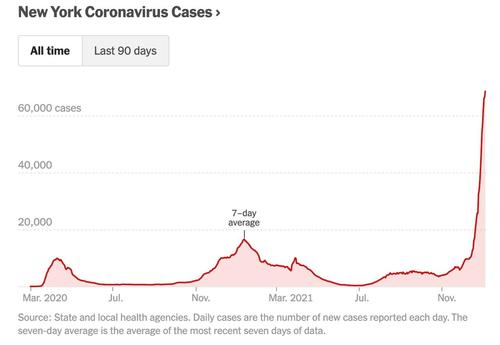One day after New York's Gov. Kathy Hochul delivered her state of the state address - her first major address since taking over from her former boss Gov. Andrew Cuomo this past summer - the NYT and the rest of the media gallery praised her performance. But despite her alluring promises about ending "unproductive" rivalries between the elected leaders of NYC and the Empire State.
Unfortunately, she still has one major, economy-wrecking problem to solve, and it's this: on any day this week, some 1,300 people out of a work force of 6.3K (roughly 1/5th) have been absent from work from the MTA due the ongoing crush of omicron case.
The soaring jump in absenteeism, which the transportation authority attributes to the virus, has meant a lack of workers to keep up with the regular train schedules, leading officials to suspend service this week on three of the system’s 22 subway lines and reduce schedules on many others, leading to longer wait times.
NYC's shortage of workers has made it the most critically underserved public transit system in the country, the NYT reports.
"I feel like it’s been bad since Christmas," Jennifer Hall, 41, said Wednesday morning as she waited with her son for a D train in the Bronx.
The news comes as New York State confirmed 85K new cases on Thursday, a new daily record for the Empire State.
Source: NYT
The surge in worker absences comes as the transportation authority has already been contending with a smaller work force after a rush of retirements and a pandemic-related hiring freeze was lifted last February.
Unlike other public workers, MTA employees are not restricted by the vaccine mandate (although if they aren't vaccinated they must submit to a test every week).
The MTA's troubles are hardly unique; they're part of a wider issue of staffing shortages that has lead to thousands of flights being cancelled, along with train delays across the country.
In particular, sick calls have soared in recent weeks: "We have seen increased sick calls, more than we have seen in the past," said Craig Cipriano, the interim president of the division of the transportation authority. The number swelled through the end of the year, with unplanned absences currently more than three times higher than their typical levels before the pandemic.
The number of subway riders in NYC has fluctuated dramatically, often following the COVID case numbers in an inverse pattern. Unsurprisingly, this has forced the MTA to make some exceptions to its virus-related worker absences.
Subway ridership this week stood at about 40 percent of prepandemic numbers, transit officials said. That is a drop from levels that climbed above 50 percent in November, but still represents millions of passengers.
For now, at least, the MTA's leaders expect the worker shortages to get better, not worse.
Still, Mr. Cipriano said there was reason to believe that the suspensions and delays caused by virus-related worker absences would soon ease, though he would not specify when. Already this week, he said, the absentee numbers showed signs they may be reversing. Transit employees who test positive for the virus get up to two weeks of sick leave beyond their standard sick time, which is 12 days per year. In the transit authority’s guidance to employees, which mirrors recent guidance from the federal Centers for Disease Control and Prevention, it suggests that vaccinated workers who test positive for Covid-19 must isolate for at least five days and can return to work only if they have been without a fever for three days, have no runny nose and a “minimal cough."
Unvaccinated workers who have tested positive or been exposed to the virus must isolate for 10 days before returning to work. Transit officials have said that about 80 percent of its roughly 67,000 employees were vaccinated, and that they were unlikely to impose a stricter vaccine requirement out of concern that it might further disrupt service at a time when the system can scarcely afford it.
Fortunately, Cipriano and the rest of the MTA leadership don't expect to halt round-the-clock service any time soon. At the very least, they feel they would be able to run fewer trains per hour before they're stuck with having to dial back service, forcing passengers who keep odd hours to pay for cab fare after leaving work late at night or early in the morning.

No comments:
Post a Comment
Note: Only a member of this blog may post a comment.